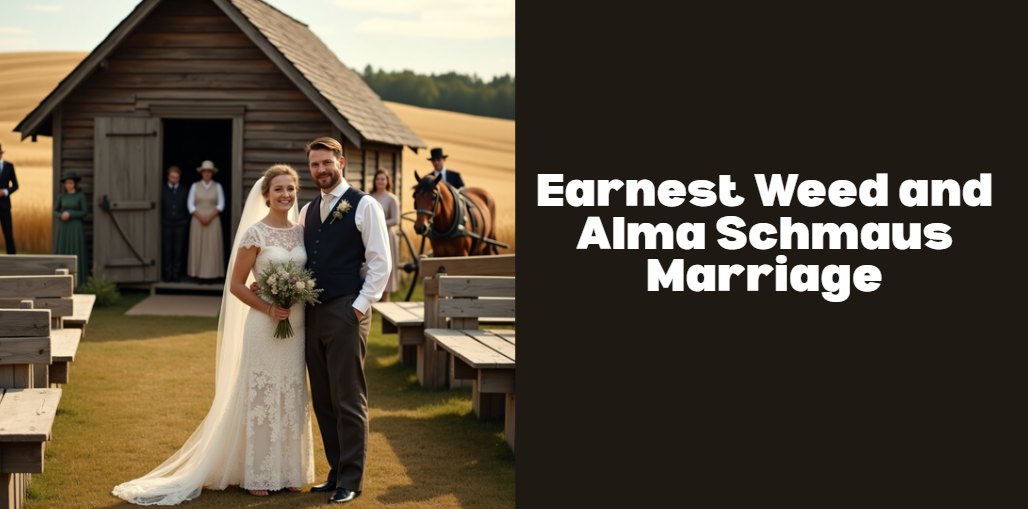The Complete Story of Earnest Weed and Alma Schmaus Marriage: A Historical Legacy
The story of the Earnest Weed and Alma Schmaus marriage is a remarkable account of love, tradition, and enduring commitment rooted in early 20th-century American life. This union reflects not only the personal bond between two individuals but also the cultural, social, and historical fabric of the era they lived in.
Their marriage offers modern readers a glimpse into how values, family roles, and resilience shaped relationships over time.
Background of the Couple
Earnest Weed
Earnest Weed was raised in a rural Midwestern farming community, where simplicity, hard work, and faith were core values. From a young age, he was involved in agricultural responsibilities, learning to manage livestock, sow crops, and care for the land.
Education for Earnest was likely limited to a few years of formal schooling, as many rural families needed children to contribute to the family economy. Still, Earnest was known for his practical intelligence, reliability, and strong moral compass.
Alma Schmaus
Alma Schmaus came from a family of German immigrants who brought with them a rich cultural heritage. Her upbringing was steeped in community traditions, religious observance, and domestic training.
She learned the arts of cooking, sewing, and homekeeping from her mother and grandmother—skills that would serve her well in her later years as a wife and mother. Alma was also fluent in both German and English, helping bridge generational divides in her family and community.
Meeting & Courtship
The meeting of Earnest Weed and Alma Schmaus was likely facilitated by mutual acquaintances through church, local socials, or community gatherings—common venues for courtship during that time. Unlike today’s fast-paced dating culture, early 20th-century courtships were intentional, often involving the families and taking place under the watchful eyes of chaperones.
Their connection grew through shared values and frequent interactions during Sunday services, community meals, and seasonal festivals. Letters may have played a role in their relationship, as writing was a popular way to express feelings in a time when direct communication was more reserved.
The Wedding Ceremony
The Earnest Weed and Alma Schmaus marriage ceremony was likely a modest but heartfelt occasion held in a local church or the family home. Weddings of this era were deeply community-centered and tied to cultural customs.
Traditional Wedding Elements:
| Aspect | Details |
|---|---|
| Venue | Rural church or family farmhouse parlor |
| Attire | Modest white dress for Alma; suit for Earnest, possibly borrowed |
| Guests | Extended family, close neighbors, church community |
| Rituals | Blessings by a pastor, religious hymns, ring exchange |
| Reception | Simple meal, homemade desserts, hand-played music and dance |
One unique feature of their wedding was likely the fusion of German and American customs. Alma’s family may have incorporated traditions such as offering homemade German pastries, while Earnest’s upbringing influenced the use of local, seasonal ingredients and country music during the celebration.
Early Married Life
After the ceremony, the couple began their married life in a humble home, possibly on a plot of land given by Earnest’s parents. Their house would have been small by modern standards—often a two-room wooden structure with a kitchen and shared sleeping space.
Earnest continued farming or found work as a laborer, depending on the economic conditions of the time. Alma became the heart of the home, handling cooking, cleaning, sewing, and child-rearing. Their daily lives were structured but filled with shared purpose and mutual support.
Their marriage was defined by hard work and collaboration. While Earnest tended to crops or livestock, Alma managed meals and kept the household running smoothly, often multitasking as both caregiver and contributor to the family’s income through quilting, butter churning, or seasonal jobs.
Family Expansion & Traditions
The Earnest Weed and Alma Schmaus marriage bore the fruits of a growing family. They likely raised several children, instilling in them a strong work ethic, religious faith, and respect for tradition.
Family life was rich with seasonal routines and customs:
Common Family Traditions:
- Sunday church attendance followed by family meals.
- Homemade holiday decorations for Christmas and Easter.
- Celebrating harvests with family picnics and storytelling.
- Cooking generational recipes such as Sauerbraten and cornbread.
- Teaching children practical skills—farming, sewing, reading scripture.
These traditions formed the backbone of the household and were passed on to grandchildren and great-grandchildren, keeping the memory and values of Earnest and Alma alive.
Navigating Challenges
Like many couples of their era, the Weed-Schmaus household faced its share of trials. The economic turmoil of the Great Depression and the impact of World War I and II affected their community deeply. Earnest may have struggled with fluctuating crop prices or food shortages, while Alma had to stretch limited resources to feed and clothe the family.
Despite these hardships, their relationship remained resilient. The shared burden of survival brought them closer, reinforcing their partnership and faith. Loss of relatives, health challenges, and financial strains were met with quiet strength and support from each other and the surrounding community.
Legacy & Genealogical Importance
The legacy of the Earnest Weed and Alma Schmaus marriage is still felt by descendants who preserve stories, family photos, and cherished traditions. Genealogists tracing this lineage will find rich documentation across census records, land deeds, and church marriage certificates.
Genealogical Research Avenues:
| Resource | Type of Information |
|---|---|
| Census Records | Household members, occupations, property details |
| Marriage Certificate | Date, witnesses, clergy, legal names |
| Church Registers | Baptisms, marriages, funerals, memberships |
| Newspapers | Marriage announcements, obituaries, social columns |
Their descendants honor their legacy through family reunions, photo albums, oral history recordings, and even digital genealogy trees that allow new generations to explore their roots.
Cultural Context & Lessons
The Earnest Weed and Alma Schmaus marriage provides insight into a time when love and duty were intertwined. Relationships were rooted in necessity, shared labor, and common faith, quite different from modern expectations of romance and independence.
Where today’s marriages may prioritize personal growth, theirs emphasized resilience, practicality, and community support. However, their union teaches enduring lessons about commitment, adaptability, and the beauty of building something lasting through mutual effort.
Conclusion
The marriage of Earnest Weed and Alma Schmaus stands as a historical and emotional touchstone, reminding us of the power of tradition, partnership, and perseverance. Their life together offers not only a personal love story but a model of how marriages can shape families, influence communities, and echo through generations.
Their journey, though framed by the context of a different time, remains relevant today as a story of enduring love and unwavering support. It’s a legacy worth celebrating and remembering.
Recommended Articles
Melekaike Laka: Meaning, Origins, Symbolism & Modern Spiritual Use Explained
High-Resolution Guide to imagesize:地藏王菩薩 1920×1080 – Meaning, Uses & Symbolism
4406445085 Caller Number: Scam or Legit? Detailed Guide to Identify and Protect Yourself
How to Keep Dudokkidzo: Complete Guide for Long-Term Care & Bonding






